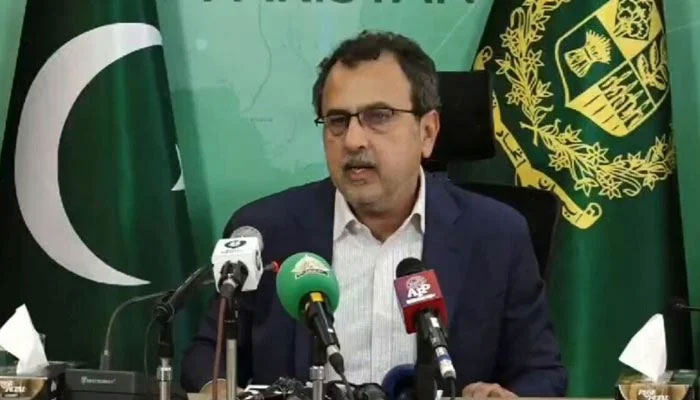Pakistan, Russia sign protocol on rail connectivity
Minister says rail link will allow Moscow to export natural gas, machinery, steel and other industrial goods to Islamabad
ISLAMABAD: A historic rail link between Pakistan and Russia is on the horizon, with the inaugural test cargo train slated to reach Pakistan by March 2025. “On the issue of connectivity, both the countries signed the protocol in Moscow. The train from Russia will adopt the route of Turkmenistan-Iran and then through Taftan it will enter Pakistan. This would be a landmark initiative providing impetus to the bilateral trade between Pakistan and Russia,” a senior Pakistan government official from Moscow told The News. “Top officials of Pakistan Railways worked hard in Moscow to make progress on the issue of connectivity 7-8 days before the IGC (Inter-Governmental Commission) meeting.”
Sardar Awais Ahmed Khan Leghari, who headed the Pakistan delegation in the IGC meeting while talking to the Russian media, also confirmed that both sides had agreed on rail connectivity and signed the protocol. The train, the official said, would take 2-3 weeks to arrive in Pakistan. However, there are some issues relating to FBR for appointing customs officials at the entry point of Pakistan, which would be resolved with the passage of time.
To a question, he said that the proper MoU was not signed as for MoU, there is a need for approval by the federal cabinet. “A rail link between Russia and Pakistan would provide an efficient and cost-effective route for the transport of goods. This could significantly boost trade in energy resources, agricultural products, minerals, machinery, and consumer goods.”
The rail link, he said, would allow Russia to export oil, natural gas, machinery, steel, and other industrial goods to Pakistan.
It would also give Pakistan access to Russian markets for its exports, including textiles, food products, and agricultural goods. “This corridor could facilitate the transport of rice, wheat, and cotton from Pakistan to Russia, as well as the movement of manufactured goods and electronics.”
The development of a direct rail network would help reduce transportation costs, both by shortening travel times and reducing reliance on sea routes or air cargo, which are generally more expensive and slower. There is an operational railway link between Turkmenistan and Iran that connects the Turkmen town of Serkhetabat (near the Turkmenistan-Iran border) to Mashhad in Iran.
Iran and Pakistan are connected by the Zahedan-Mirjaveh railway. Iran is also connected to Taftan station in Pakistan. This line connects the Iranian city of Zahedan to the Pakistani border town of Mirjaveh, facilitating trade and passenger movement between the two countries.
-
 Eric Dane's Girlfriend Janell Shirtcliff Pays Him Emotional Tribute After ALS Death
Eric Dane's Girlfriend Janell Shirtcliff Pays Him Emotional Tribute After ALS Death -
 King Charles Faces ‘stuff Of The Nightmares’ Over Jarring Issue
King Charles Faces ‘stuff Of The Nightmares’ Over Jarring Issue -
 Sarah Ferguson Has ‘no Remorse’ Over Jeffrey Epstein Friendship
Sarah Ferguson Has ‘no Remorse’ Over Jeffrey Epstein Friendship -
 A$AP Rocky Throws Rihanna Surprise Birthday Dinner On Turning 38
A$AP Rocky Throws Rihanna Surprise Birthday Dinner On Turning 38 -
 Andrew Jokes In Hold As BAFTA Welcomes Prince William
Andrew Jokes In Hold As BAFTA Welcomes Prince William -
 Sam Levinson Donates $27K To Eric Dane Family Fund After Actor’s Death
Sam Levinson Donates $27K To Eric Dane Family Fund After Actor’s Death -
 Savannah Guthrie Mother Case: Police Block Activist Mom Group Efforts To Search For Missing Nancy Over Permission Row
Savannah Guthrie Mother Case: Police Block Activist Mom Group Efforts To Search For Missing Nancy Over Permission Row -
 Dove Cameron Calls '56 Days' Casting 'Hollywood Fever Dream'
Dove Cameron Calls '56 Days' Casting 'Hollywood Fever Dream' -
 Prince William, Kate Middleton ‘carrying Weight’ Of Reputation In Epstein Scandal
Prince William, Kate Middleton ‘carrying Weight’ Of Reputation In Epstein Scandal -
 Timothée Chalamet Compares 'Dune: Part Three' With Iconic Films 'Interstellar', 'The Dark Knight' & 'Apocalypse Now'
Timothée Chalamet Compares 'Dune: Part Three' With Iconic Films 'Interstellar', 'The Dark Knight' & 'Apocalypse Now' -
 Little Mix Star Leigh-Anne Pinnock Talks About Protecting Her Children From Social Media
Little Mix Star Leigh-Anne Pinnock Talks About Protecting Her Children From Social Media -
 Ghislaine Maxwell Is ‘fall Guy’ For Jeffrey Epstein, Claims Brother
Ghislaine Maxwell Is ‘fall Guy’ For Jeffrey Epstein, Claims Brother -
 Timothee Chalamet Rejects Fame Linked To Kardashian Reality TV World While Dating Kylie Jenner
Timothee Chalamet Rejects Fame Linked To Kardashian Reality TV World While Dating Kylie Jenner -
 Sarah Chalke Recalls Backlash To 'Roseanne' Casting
Sarah Chalke Recalls Backlash To 'Roseanne' Casting -
 Pamela Anderson, David Hasselhoff's Return To Reimagined Version Of 'Baywatch' Confirmed By Star
Pamela Anderson, David Hasselhoff's Return To Reimagined Version Of 'Baywatch' Confirmed By Star -
 Willie Colón, Salsa Legend, Dies At 75
Willie Colón, Salsa Legend, Dies At 75




